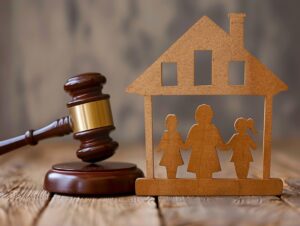Considering living in a HOA community in Florida?
Before making your decision, it’s important to understand the benefits, responsibilities, rights, and common laws associated with homeowners associations in the state.
This article will provide you with all the key information you need to know, from maintenance and property value protection to enforcing rules and resolving disputes. Let’s dive into the world of HOAs in Florida and explore what they entail.
Key Takeaways:

- Living in a HOA community provides benefits such as maintenance of common areas, access to amenities, and protection of property value.
- A Homeowners Association is responsible for enforcing rules, collecting dues, and managing finances.
- Homeowners in a HOA community have rights including access to documents, voting, and attending board meetings.
What are the Benefits of Living in a HOA Community?
Residing in a homeowner association (HOA) community provides several advantages, such as:
- Well-maintained common areas
- Access to various amenities
- The preservation of property values through enforced regulations and rules
1. Maintenance and Upkeep of Common Areas
One notable advantage of residing in a homeowner association community is the consistent maintenance and upkeep of common areas, typically funded through fees collected from members.
These fees are managed by the HOA board to guarantee that vital services like landscaping, trash removal, and maintenance of community facilities are promptly addressed. Common areas that are usually maintained include parks, swimming pools, sidewalks, and entrance signs, all in efforts to enhance the overall aesthetics and functionality of the neighborhood.
Maintaining well-kept surroundings not only boosts the curb appeal of the community but also cultivates a sense of pride among residents and has the potential to increase property values.
2. Community Amenities
HOA communities commonly provide residents with access to various amenities such as swimming pools, fitness centers, and recreational facilities. These amenities aim to improve the quality of life for members by encouraging physical activity, relaxation, and social interaction within the community.
Residents can engage in swimming for exercise or leisure, utilize fitness centers to maintain health, and participate in group activities at recreational facilities. To ensure that all residents can maximize the benefits of these amenities, HOAs usually set regulations regarding their usage. These regulations may include specific operating hours, guest policies, and safety guidelines to uphold a harmonious environment for all members.
3. Property Value Protection
The homeowner association enforces rules and regulations to maintain property values within the community by ensuring compliance with established standards.
Residents contribute to a cohesive neighborhood aesthetic by following guidelines on property maintenance, architectural modifications, and landscaping requirements set by the HOA. These regulations, such as those concerning exterior paint colors, lawn care, and holiday decorations, often enhance the visual appeal of the environment, boosting curb appeal and overall property desirability.
Strict enforcement of rules related to noise levels, parking, and common area upkeep fosters a harmonious atmosphere that encourages a sense of community pride and investment in preserving property values.
What are the Responsibilities of a Homeowners Association?
The responsibilities of a homeowners association (HOA) include:
- Enforcing community rules and regulations
- Collecting dues and assessments from members
- Managing the community’s finances to ensure proper upkeep and improvement of property and amenities
1. Enforcing Rules and Regulations
One of the primary responsibilities of a homeowners association is to enforce the established rules and regulations to ensure community compliance. This enforcement is typically carried out through regular inspections, issuing warnings, and imposing fines for infractions. Common types of regulations include guidelines on property maintenance, architectural standards, noise levels, and pet policies.
The HOA aims to create a cohesive and harmonious living environment by upholding these rules. While some residents may perceive the enforcement as strict, it ultimately contributes to maintaining property values and the overall aesthetics of the neighborhood. A well-enforced HOA can also foster a sense of community and improve the quality of life for all residents.
2. Collecting Dues and Assessments

The collection of dues and assessments from members is a crucial responsibility of the homeowners association, as these funds are necessary for community operations and improvements. The process of collecting dues involves sending out invoices to homeowners, detailing the breakdown of fees and payment deadlines.
Fees are typically determined based on factors such as the size of a property, amenities offered, and maintenance costs. These assessments play a vital role in funding various community activities such as landscaping, security services, and maintenance of common areas.
They ensure that the neighborhood remains well-maintained and that essential services are provided to all members. Effective management of dues is key to sustaining a vibrant and cohesive community environment.
3. Managing Finances
Managing the community’s finances, which includes preparing financial statements and conducting regular audits, is a primary responsibility of the homeowners association board of directors.
Financial management processes are crucial in ensuring that the resources of the homeowners association are used effectively and transparently.
By keeping accurate financial statements, the board can monitor income and expenses, spot trends, and make informed decisions regarding budgeting and expenditures. Regular audits also boost accountability by offering an independent evaluation of the association’s financial well-being and adherence to regulations.
Transparency in financial affairs is vital for building trust among homeowners and fostering the long-term sustainability of the community.
What are the Rights of Homeowners in a HOA Community?
Residents of a homeowners association (HOA) community have certain rights, such as access to HOA documents, the opportunity to vote on important issues, and the right to attend board meetings to stay updated on community decisions and governance.
1. Access to HOA Documents
Homeowners are entitled to access HOA documents, which encompass governing documents, financial records, and meeting minutes, in accordance with Florida Statutes.
These documents are essential for transparency within homeowners’ associations, providing valuable insights into the management of the community and the allocation of funds. By reviewing the governing documents, residents can grasp the rules and regulations governing their community, ensuring compliance.
Financial records offer a snapshot of the association’s financial status, detailing income, expenses, reserves, and more. Meeting minutes record discussions and decisions made by the association’s board, offering homeowners clarity on the decision-making process.
Access to these documents enables homeowners to make informed decisions and actively engage in the governance of their community.
2. Voting Rights
Homeowners are granted voting rights that enable them to take part in board elections and crucial community decisions, ensuring their input is considered in the community’s governance.
To exercise these important voting rights, homeowners typically receive a notice that outlines the upcoming board elections and provides instructions on how to vote. This process usually entails reviewing candidate profiles, participating in candidate forums, or utilizing online voting platforms. By actively participating in the voting process, homeowners play a key role in influencing the direction of their community.
The voting procedures, including eligibility criteria, voting deadlines, and the minimum required number of votes for decisions to be binding, are often outlined in governing documents such as the HOA bylaws or Declaration.
3. Right to Attend Board Meetings
Homeowners have the right to attend board meetings, giving them the opportunity to stay informed about community governance and participate in the decision-making process. During these meetings, various topics related to the community are discussed, such as budget allocation, maintenance issues, rule enforcement, and future planning.
Attending these meetings enables homeowners to voice their concerns, offer suggestions, and contribute to the decision-making process. By actively engaging in discussions and sharing their perspectives, homeowners can play a crucial role in shaping the direction of their community.
Participating in board meetings fosters a sense of transparency and accountability, ensuring that decisions are made in the best interest of all residents.
What are the Common HOA Laws in Florida?
Common HOA laws in Florida consist of the Florida Condominium Act, the Florida Homeowners’ Association Act, and the Florida Cooperative Act. These laws offer a legal framework for the governance and operation of various types of community associations.
1. Florida Condominium Act

The Florida Condominium Act sets legal regulations and compliance requirements for condominiums to ensure proper governance and management of these communities.
Under this Act, condominium associations must follow certain guidelines related to financial reporting, elections, board member responsibilities, and reserve fund management.
The Act also details the procedures for establishing, modifying, and enforcing association bylaws, promoting transparency and accountability within the community. Adhering to these provisions is essential for sustaining the effective functioning of condominiums and safeguarding the rights and interests of unit owners.
2. Florida Homeowners’ Association Act
The Florida Homeowners’ Association Act establishes the legal framework for the governance and operation of homeowner associations. It outlines the responsibilities and powers of the HOA and its members.
The Act sets up the governance structure of HOAs, which includes a board of directors elected by the members to manage the association’s affairs. These boards are tasked with creating and enforcing bylaws that act as rules governing the community. Bylaws cover various aspects like architectural guidelines, maintenance responsibilities, and membership dues.
Members of the association have rights, including attending meetings, voting on important issues, accessing financial records, and participating in the decision-making process. On the other hand, members also have responsibilities, such as following the bylaws, paying dues on time, and maintaining their properties in line with community standards.
3. Florida Cooperative Act
The Florida Cooperative Act establishes the rules and governance requirements for cooperative associations, providing a legal framework for the management of these distinct communities. Cooperative associations, as defined by the Act, consist of individual units or apartments where residents collectively own the entire property and common areas.
A significant aspect of the Act is that cooperative associations are overseen by a board of directors responsible for managing the community’s operations, maintenance, and finances. This board is elected by the unit owners and has defined roles and duties to ensure transparency and accountability.
In contrast to other types of community associations like condominiums or homeowners’ associations, cooperative associations have a more intricate ownership structure that involves shares in the cooperative corporation rather than individual unit titles.
What are the Steps to Resolve HOA Disputes in Florida?
In Florida, homeowners and associations commonly follow specific steps to address HOA disputes. These steps usually involve:
- Reviewing the governing documents
- Engaging in mediation
- Pursuing arbitration
- Potentially filing a lawsuit
1. Reviewing the HOA Governing Documents
The initial step in addressing HOA disputes involves analyzing the governing documents to comprehend the rules, regulations, and compliance requirements relevant to the matter.
These governing documents typically consist of the HOA’s bylaws, CC&Rs (Covenants, Conditions, and Restrictions), and rules and regulations. Through a thorough examination of these documents, homeowners can acquire insights into what actions are permissible within the community and what behaviors may result in disputes. Understanding these guidelines is essential as they establish the basis for any conflict resolution process.
A clear understanding of the rules enables homeowners to navigate disputes efficiently, offering clarity on how to handle issues in accordance with the community’s established procedures.
2. Mediation
Mediation is a voluntary process where both parties in a dispute work with a neutral third-party mediator to find a mutually acceptable resolution. This process fosters communication between the conflicting parties, enabling them to express their concerns and viewpoints in a controlled environment.
By promoting open dialogue and active listening, mediation encourages empathy and understanding, often uncovering underlying issues that go beyond the surface dispute.
One of the key benefits of mediation is that it allows individuals to retain control over the outcome, rather than relying on a judge’s decision. Mediation is known for its confidentiality, offering a private setting for negotiations that can preserve relationships and prevent further escalations of conflicts.
Through mediation, parties can craft creative and personalized solutions that address their specific needs and interests, ultimately fostering a sense of ownership and compliance with the resolution reached. Not only does mediation provide a quicker and more cost-effective alternative to traditional litigation, but it also contributes to maintaining community harmony by facilitating peaceful and amicable resolutions.
3. Arbitration
Arbitration is a formal dispute resolution process in which an arbitrator renders a binding decision based on the evidence and arguments presented by both parties.
This method is often favored by Homeowner Associations (HOAs) due to its perceived speed and cost-effectiveness compared to court proceedings. In arbitration, both parties are given the chance to present their case, and the arbitrator’s decision is final and legally binding.
In contrast to litigation, arbitration provides more control over the process and outcome, allowing parties to select the arbitrator and have greater flexibility in scheduling. However, one of the drawbacks of arbitration is the limited options for appeal, potentially leaving parties bound by a decision they do not agree with.
4. Filing a Lawsuit

If other dispute resolution methods fail, filing a lawsuit may be necessary to resolve the issue through the legal system.
Before initiating a lawsuit, it is crucial to consider the potential legal implications and complexities involved in the process. Lawsuits often require substantial time, resources, and energy to navigate through the various stages, from filing the initial complaint to presenting evidence in court.
It is advisable to consult with a qualified attorney to assess the strength of your case and to understand the potential costs involved. Exploring alternative dispute resolution methods such as mediation or arbitration can be beneficial before resorting to litigation as it may provide a quicker and more cost-effective resolution.
Frequently Asked Questions
What is a homeowners association (HOA) in Florida?
A homeowners association in Florida is a legal entity that governs and manages a planned community or neighborhood. It is responsible for enforcing rules and regulations, collecting fees and managing common areas.
What are the responsibilities of an HOA in Florida?
An HOA in Florida is responsible for maintaining common areas, enforcing community rules and regulations, and managing the community’s finances. It also has the power to impose fines and liens on homeowners who do not comply with the rules.
What laws govern homeowners associations in Florida?
Homeowners associations in Florida are governed by Chapter 720 of the Florida Statutes, also known as the Florida Homeowners’ Association Act. These laws outline the rights and responsibilities of both the HOA and homeowners.
Can an HOA in Florida foreclose on a homeowner’s property?
Yes, under certain circumstances, an HOA in Florida can foreclose on a homeowner’s property for non-payment of fees or violations of community rules. However, the HOA must follow specific procedures outlined in the Florida Statutes.
What are the voting rights of homeowners in a Florida HOA?
Each homeowner in a Florida HOA is entitled to one vote per property. However, certain decisions, such as amending governing documents or approving special assessments, may require a supermajority vote.
What should I do if I have a dispute with my Florida HOA?
If you have a dispute with your Florida HOA, you should first try to resolve it directly with the HOA. If that is not successful, you may file a complaint with the Department of Business and Professional Regulation or seek legal counsel.























Rate this article:
Average rating 0 / 5. Vote count: 0
No votes so far! Be the first to rate this post.
No Comments yet!